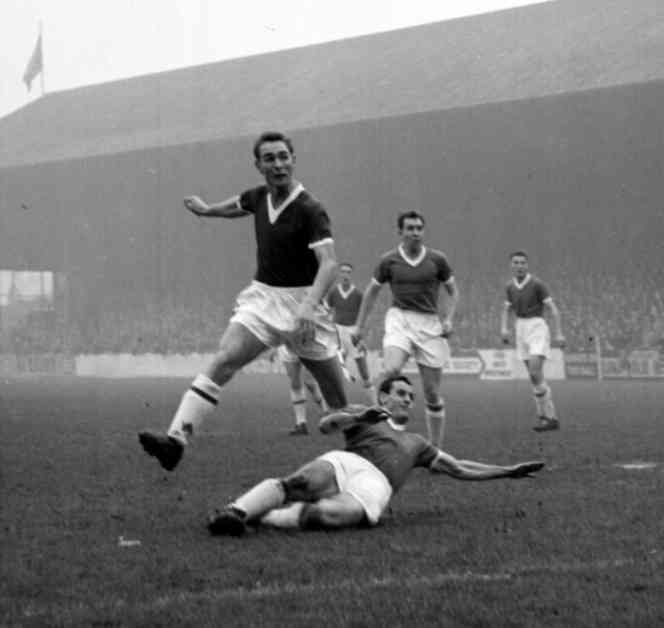Brian Clough, a legendary figure in the world of football, saw his playing career come to an abrupt halt 60 years ago due to a devastating knee injury. The incident occurred on Boxing Day in 1962 during a match between Sunderland and Bury at Roker Park. Clough, a powerful center forward, collided with goalkeeper Chris Harker while chasing a through ball from full back Len Ashurst. The impact tore the medial and cruciate ligaments in his knee, leaving him writhing in pain on the pitch. It was a heartbreaking moment for fans who watched in horror as Clough, known for his strength and skill, struggled to get back on his feet.
The road to recovery was long and arduous for Clough, who spent over a year undergoing rehabilitation, including running up and down the terracing at Roker Park. Despite the severity of his injury, Clough remained determined to make a comeback. His resilience and unwavering spirit were evident when he returned to the pitch with the Sunderland reserve team at Grimsby on August 22, 1964. It was a momentous occasion for Clough, who described it as starting the game anew. In his next game, he showcased his talent by scoring a hat-trick for the reserves against Halifax Town, signaling his readiness to return to top-tier football.
Clough’s official comeback to the First Division came on September 2, 1964, in a match against West Bromwich Albion at Roker Park. The inclusion of Clough in the Sunderland lineup was met with excitement and anticipation from fans. Despite failing to score in his first game back, Clough’s presence on the field injected new energy into the team. The match against West Bromwich Albion was a thrilling affair, with Sunderland fighting back twice to equalize in front of a passionate crowd of 52,117. Although Clough’s name was not on the scoresheet, his performance showcased his determination and talent, setting the stage for his return to top form in the First Division.
With each game, Clough’s impact on the Sunderland team became more apparent. His skill and goal-scoring prowess were on full display in a match against Leeds on September 5, where he scored a diving header to spark a comeback that resulted in three goals in nine minutes. Despite an equalizing goal from Leeds, Clough’s contribution to the team’s performance was undeniable. He continued to impress in subsequent matches, including a game against Aston Villa on September 9, where a last-minute goal by Hurley salvaged a draw for Sunderland. However, Clough’s persistent knee issues began to resurface, ultimately leading to his decision to retire from playing football.
Len Ashurst, the full back whose through ball led to Clough’s fateful collision, shared insights into his relationship with the iconic player. Ashurst recalled a humorous encounter with Clough during his time as the manager of Derby County, where Clough’s candid remarks left a lasting impression. Despite the incident that ended Clough’s playing career, Ashurst’s recollection highlighted the camaraderie and banter that defined their interactions on and off the field.
As we reflect on Brian Clough’s playing career, it is evident that his impact on the world of football transcends the boundaries of time. His resilience in the face of adversity, his passion for the game, and his unwavering commitment to excellence continue to inspire players and fans alike. Sixty years after his injury, Clough’s legacy lives on as a testament to the enduring spirit of the beautiful game and the indelible mark left by a true footballing genius.
Legacy of Brian Clough
Brian Clough’s legacy extends far beyond his playing career, encompassing his remarkable achievements as a manager and his enduring influence on the world of football. While his playing days may have been cut short by injury, Clough’s transition to coaching marked the beginning of a legendary career that saw him achieve unprecedented success with clubs such as Derby County and Nottingham Forest. His innovative tactics, charismatic persona, and ability to inspire players set him apart as one of the greatest football managers of all time.
Impact on English Football
Clough’s impact on English football cannot be overstated, as he revolutionized the game with his unconventional methods and unyielding belief in his players. His managerial tenure at Derby County saw the club rise from obscurity to become champions of England, a feat that had seemed unimaginable before Clough’s arrival. His subsequent success at Nottingham Forest, where he guided the team to two European Cup triumphs, cemented his reputation as a footballing genius and a true visionary of the sport.
Enduring Influence
Even decades after his passing, Brian Clough’s influence continues to be felt in the world of football. His legacy lives on in the principles of teamwork, dedication, and passion that he instilled in his players. The “Cloughisms,” or memorable quotes and sayings attributed to him, serve as timeless reminders of his wit, wisdom, and unique approach to the game. From his iconic red jackets to his no-nonsense attitude, Clough’s larger-than-life persona has left an indelible mark on the sport and inspired generations of football enthusiasts around the world.
In conclusion, Brian Clough’s playing career may have ended 60 years ago, but his impact on football remains as powerful as ever. His resilience, talent, and unwavering passion for the game continue to inspire players, coaches, and fans alike. As we reflect on his storied career, we are reminded of the enduring legacy of a true footballing icon whose influence transcends generations.

